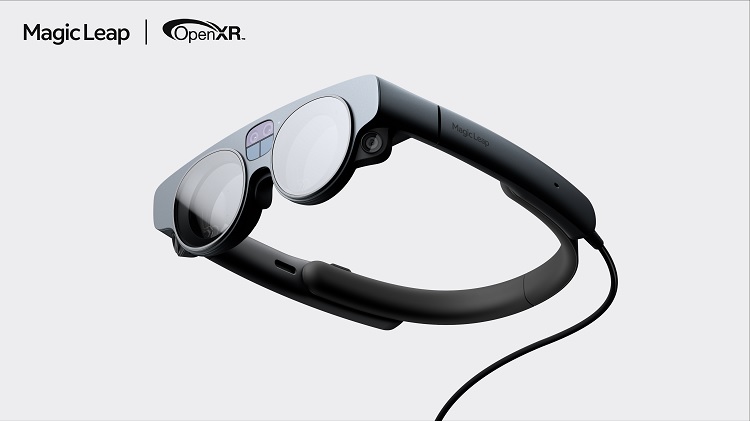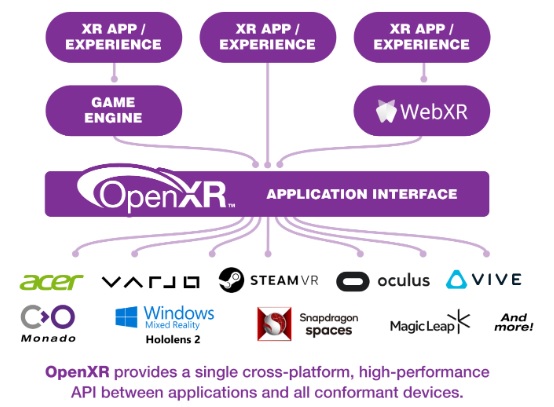
In Augmented Reality News
April 27, 2023 – Enterprise spatial computing company Magic Leap has this week announced that its Magic Leap 2 headset is now conformant with OpenXR, a royalty-free open standard designed by the Khronos Group to help simplify XR development by enabling developers to access more platforms while reusing the same code.
An early contributor in the development of OpenXR, Magic Leap noted its commitment to building an open and accessible augmented reality (AR) ecosystem that benefits enterprises and developers across industries.
OpenXR provides a common set of APIs for developing XR applications that work across a range of devices. According to Magic Leap, “unleashing the full potential of enterprise AR relies upon an open and accessible ecosystem, where developers can easily create cross-platform solutions, and enterprises can easily adopt them—free from siloes, walled gardens, or cloud lock-in.” The company has collaborated on the development of OpenXR since its inception to enable exactly this.
Allowing cross-platform compatibility of XR experiences through open standards like OpenXR helps to greatly reduce the time and cost required for developers to adapt solutions to individual platforms and, by extension, creates a larger market of easily-adopted solutions for enterprise users.

Magic Leap highlighted a range of benefits that it will now be able to provide to developers and enterprises with OpenXR on its Magic Leap 2 device:
- Solution portability: OpenXR enables developers to build a solution once, then easily port and optimize that solution to reach more enterprises and customers. This allows more enterprises to harness the transformative power of AR, while giving the freedom to focus on creating new solutions;
- Feature scalability: Enterprises can transition existing solutions to Magic Leap 2 and utilize the device’s advanced AR capabilities with minimal or no extra effort;
- User flexibility: Magic Leap 2 now provides enterprises with support on an open platform. This includes not only native support for OpenXR, but also cloud autonomy—with no requirement to connect to a centralized server, cloud service, or telemetry gathering, according to the company;
- Developer accessibility: OpenXR unlocks faster innovation for a larger market by making the playing field more accessible to smaller developers, enabling them to build solutions on different platforms without extensive resources. Magic Leap stated that this ultimately helps to create a virtuous cycle of market evolution and expansion;
- Platform capability: By using OpenXR, Magic Leap’s in-house developers are able to bring new engines and capabilities onto Magic Leap 2 and spend more time optimizing each new feature.
Magic Leap stated that the adoption of OpenXR as a common AR ecosystem standard will help to ensure the continual growth and maturation of AR, and that as Vice Chair of the OpenXR Working Group, the company will continue to advance this vision. In its role as Vice Chair, Magic Leap provides technical expertise and collaborates with other members to address the needs of developers and end-users, the scope of the standard, and best practices for implementation.
The company concluded by stating that it is constantly working to amplify the benefits of OpenXR for developers and end users by developing new extensions and expanding support for existing extensions. For example, the company is currently collaborating with other Working Group members to define a common Plane Detection extension. Internally, Magic Leap stated that it is working on a number of new extensions to give developers easy access to the advanced AR capabilities of Magic Leap 2.
For more information on Magic Leap and its Magic Leap 2 enterprise AR headset, please visit the company’s website. To learn more about the Khronos Group’s OpenXR royalty-free open standard for the XR industry, click here.
Image credit: Magic Leap / Khronos Group, Inc.
About the author
Sam Sprigg
Sam is the Founder and Managing Editor of Auganix. With a background in research and report writing, he has been covering XR industry news for the past seven years.




